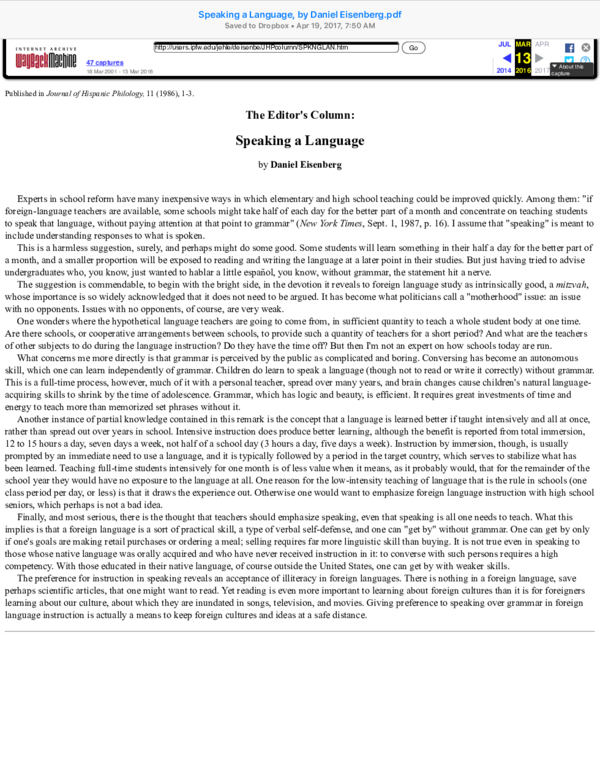Academia.edu no longer supports Internet Explorer.
To browse Academia.edu and the wider internet faster and more securely, please take a few seconds to upgrade your browser.
Speaking a Language
Speaking a Language
Speaking a Language
Speaking a Language
Speaking a Language
Giving preference to speaking in teaching language avoids exposure to written foreign ideas.
Related Papers
ABSTRACT The aim of this article is to demonstrate that Content Based Instruction (CBI) of foreign languages is indeed effective and as I will show, it is already fully implemented in Italian Secondary schools and has been practised traditionally for quite a long time, what does need to be modified to make it even more efficient and up to date to meet today’s challenges is, first of all wide-spread awareness that it does actually work and secondly, increased funds to allow students to have the necessary opportunities to have access to the right amount of language exposure and the sufficient time to let it seep in. The initial discourse about CLIL, more than 15 years ago, still meant to involve foreign language teachers alongside the subject specialist teachers in a team work setting, mainly because it was intended as a means to encourage teachers’ mobility around Europe. Afterwards instead CLIL was conveyed as a teaching practice that totally ruled out any involvement of foreign language teachers and introduced the exclusive presence of subject specialist teachers which is one of the main reasons why I don’t fully agree with this didactic method and I will explain my perplexities. It is especially quite puzzling why the expertise of so many dedicated professionals should be discriminated against and penalised despite their high competence and the excellent results achieved. Keywords: language exposure, CLIL, CBI, Bilingual Immersion, Foreign Language Teaching
Hispania Centenary Issue
The Pedagogy and Politics of Twenty-First Century Luso-Hispanic Urban Cultural Studies2017 •
Since the 1980s Anglo-American scholars in the field of Luso-Hispanic Studies have had plenty of time to think through the so-called “spatial turn” that built disciplinary bridges between the Humanities and the Social Sciences. It took approximately 20 years for key texts written in French (those of Michel Foucault, Henri Lefebvre and Michel de Certeau, for example) to be translated into English and work their way into the field. One example of such a text is “Of Other Spaces,” (a 1967 lecture of Foucault’s that was not published in English until 1984) on the everyday experience of space, where he explains that [t]he present epoch will perhaps be above all the epoch of space. We are in the epoch of simultaneity: we are in the epoch of juxtaposition, the epoch of the near and far, of the side- by-side, of the dispersed. (22) Foucault’s ideas about space had such an impact on academics in many disciplines because he explained that space was neither a mere empty container nor a backdrop for events and actions (see Tally). Rather, as Benjamin Fraser reminds us in his essay above and in much of his work on Henri Lefebvre, space is at the same time a product and a creative process. It produces each one of us, in fact, through a complex network of economic, political, social and cultural forces.
HOLISITIC DOCTRINE BASED ON RESEARCH AND EXPERIENCE by Tarin Christopher Griswold
Asian EFL Journal
The Effects of Online Grammar Instruction on Low Proficiency EFL College Students' Achievement2005 •
Technology is not currently used in EFL classrooms at King Saud University in Riyadh, Saudi Arabia. Therefore an online course was used in the teaching of English grammar from home. The aim of the present study was to find out whether integration of online learning in grammar instruction significantly improves EFL freshman college students’ achievement and attitudes. Two groups of freshman students participated in the study. Pretest means scores showed significant differences between the experimental and control groups in their grammatical knowledge. Following online instruction with Nicenet, comparisons of the posttest means scores showed significant differences in achievement. The study concluded that in learning environments where technology is unavailable to EFL students and instructors, use of an online course from home and even as a supplement to in-class techniques helps motivate and enhance EFL students' learning and mastery of English grammar.
RELATED PAPERS
Second language acquisition research in Japan
Second language acquisition research in Japan2001 •
The Asian EFL Journal Quarterly September 2006 …
Researching the influence of target language on learner task performance2006 •
… University Round Table on Languages and …
Bilingual education and the dialectics of national integration2001 •
Handbook of Research on Assessment Practices and Pedagogical Models for Immigrant Students
A Comparative Study on the Curriculum in the Community-Based Chinese Heritage Language (CHL) Schools and Dual Language Immersion (DLI) Program2019 •
Open Research Exeter
Social Experiences and Linguistic Outcomes through Foreign Language Learners' Short Stays Abroad: A Japanese Case2019 •
The Language Teacher
More motivating lesson materials: Student-centred character construction2011 •
The Modern Language Journal
Bilingual Education: Issues and Strategies1991 •
Canadian Modern Language Review
Integrating Language and Content in Immersion Classrooms: Research Perspectives1996 •
Foreign Language Annals
Content-Based Instruction for Foreign Language Classrooms1989 •
ASIAN EFL Journal
ASIAN EFL Journal Volume 20 Issue 8 August-2018.pdf2018 •

 Daniel Eisenberg
Daniel Eisenberg